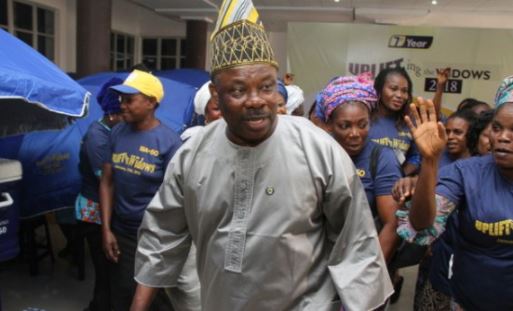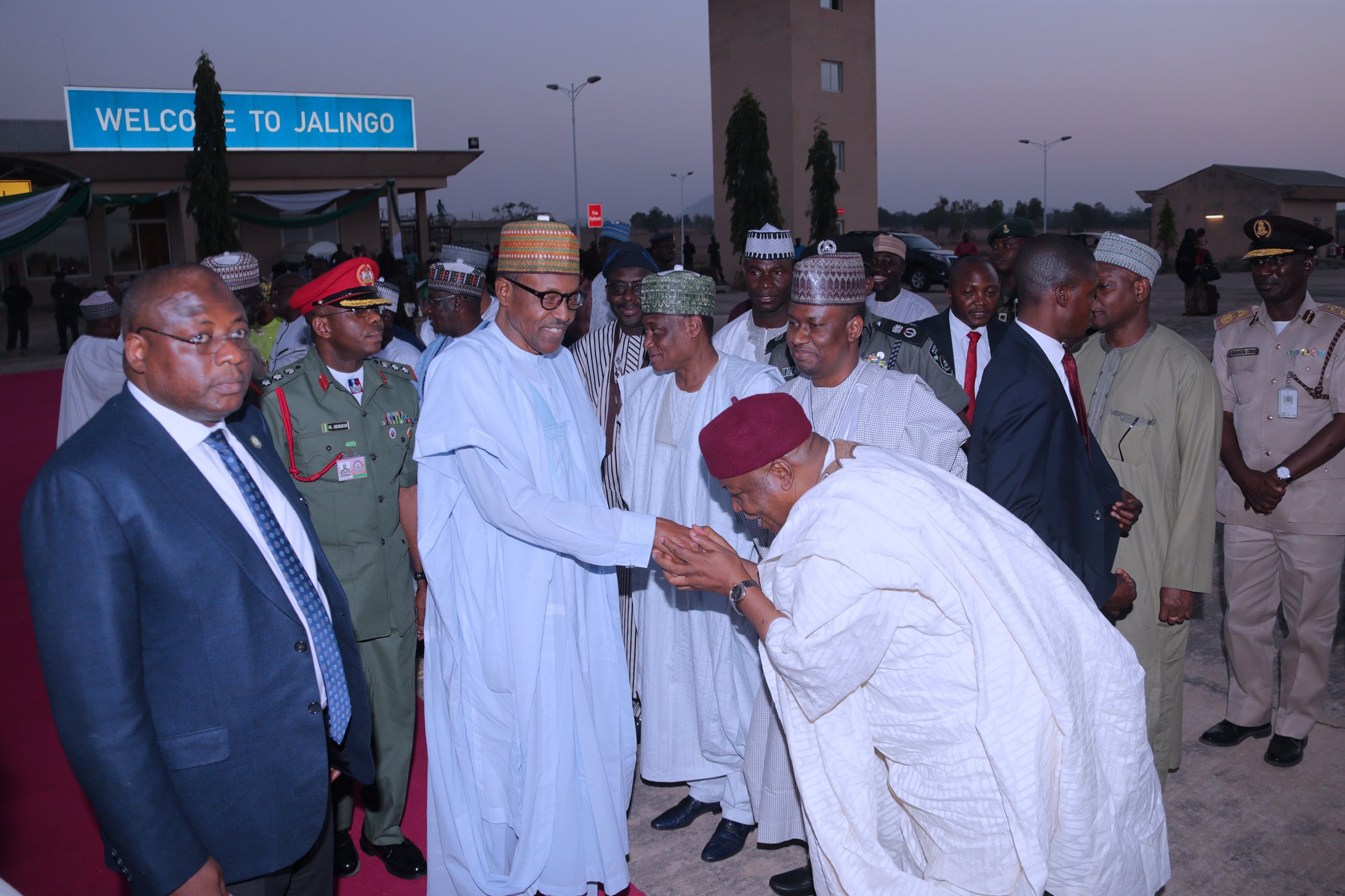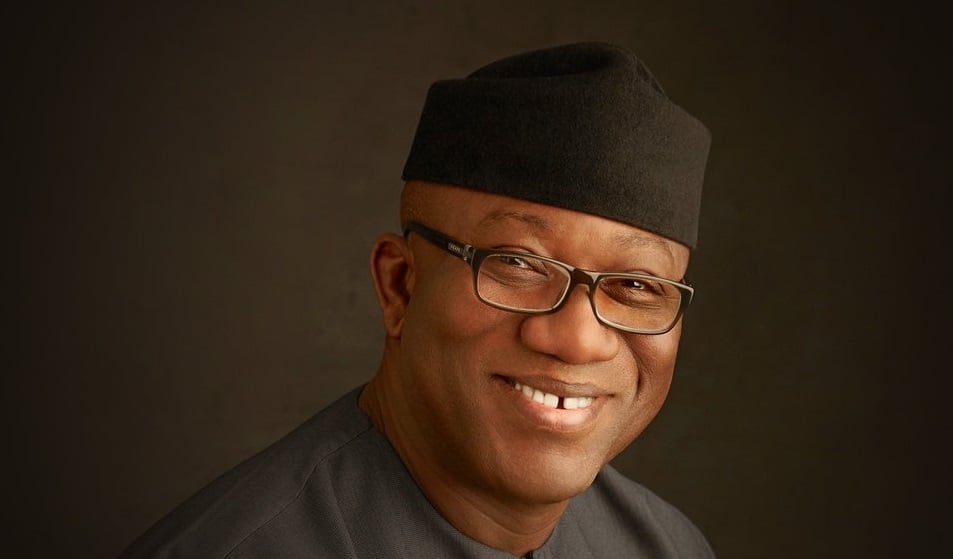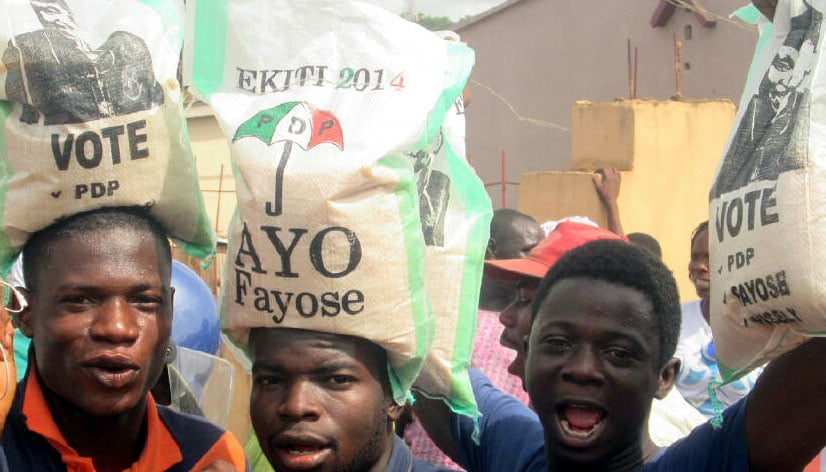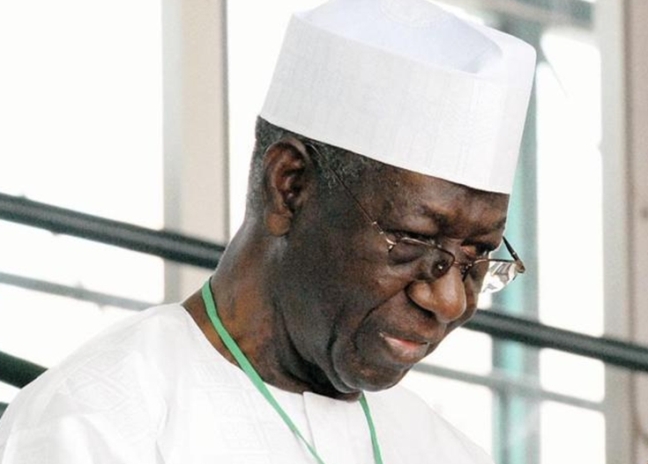Shortly before the 2003 governorship election, then Governor Olusegun Osoba had come on television to address the common grouse of Ogun State people against his four-year reign. He had apparently gleaned security report which predicted his waterloo at the polls. It was a grouse that was ostensibly the river that would shortly drown his ambition to do a second term. “I am not proud,” he had begun pleadingly. “People say I am proud… I am not proud.”
This apologia was coming rather too late to save the second journalist to rule Ogun after immortal Editor of First Republic influential newspaper, Daily Express and columnist, Bisi Onabanjo. Osoba was voted out. After eight years of being in the saddle, Gbenga Daniel, whom the electorate gleefully thumb-printed to replace Osoba, had become a lord unto himself too, enmeshed in allegations of rituals, arrogance of power and tragic attempts to play God. This piece will try to illustrate Ibikunle Amosun as the tragic power hero who – barring a last minute reversal – his twilight in power will herald even as his departs Oke-Mosan in a few months’ time.
In explaining the common thread that runs through the persona of these governors, the story of the mystic grandeur of Alaafin Sango and his elder brother, Alaafin Ajaka will clearly illustrate their glide from the zenith of power to the abyss of powerlessness. Like each of the governors too, Sango was a character whose political misfortune arises from the bitter tapestry of politics of his time in the Oyo Empire, which he personally wove, with his moral lapses and character flaws becoming indelible imprints for the rest of modern society. For would-be rulers who abhor the tragic outcome of power-drunk rulers, the Sango power model advertises doom, in and post-office.
Pardon me as I digress. There is a sustained intellectual crossfire among African historians on the correct reading of the interface and cross-cultural exchanges between the Yoruba of South West Nigeria and the people of Borgu, Nupe in present day Niger State. While historians like Idris Jimada in his The Nupe and the Origins and Evolution of the Yoruba, in seeking to reconstruct the centrality of the Nupe pre-the British conquest of the area now known as Nigeria, claimed that virtually all that the Yoruba hold as their cultural artifact, tradition and culture were imported wholesale from Nupe, some other historians have challenged this as barefaced historical revanchism. One line of oral history which may not allow Jimadu’s work to be totally consigned to the realm of historical conjecture is the relationship between the Old Oyo Empire and the Borgu and Nupe kingdoms. It demonstrates that there were inseparable interactions between both kingdoms before the British conquest that birthed modern Nigeria. It is on record, for instance, that the early Alaafins married from Borgu as confirmed by the story of the legendary hero-god, Alaafin Sango whose mother was a Tapa from Nupe.
Advertisement
Oral history tells us that Alaafin Ajaka was the second monarch of Old Oyo. Unfortunately however, his reign was pockmarked by wars. He was perceived as a weakling for his inability to contain the rampaging enemies who surrounded his kingdom, especially the war always initiated by the Owu. It was so bad that Alaafin Ajaka was captured by the Owu and imprisoned in the courtyard of the Olowu. Incensed by this impudence, the Oyomesi sent emissaries to Sango who then resided in the land of his mother in Nupe to come rescue them from the rampaging Owu. A valiant with a renowned magical power of emitting fire from his mouth like a dragon, Sango invaded Owu, vanquished the kingdom and set his brother, Ajaka free. The Oyo however declined to continue with the effeminate Ajaka as their king but installed Sango as the Alaafin instead. Like Osoba, Daniel and Amosun, Alaafin Sango was ushered into the ancient palace of Oyo-Ile with pomp and ceremony, carried in a traditional cart and the people celebrating that, thenceforth, their adversaries would dread Oyo under its new valiant and magical king. It didn’t take long for them to exhibit their crude grovel by the cult of power.
There were different accounts of Sango’s reign. Some of them were steeped in myth and legend, especially the mythical exploits of his three wives – Oba, Osun and Oya, the last said to be his concubine. Oya was also held to have been a spirit with the mythical power to transform to any animal of her choice. While some accounts held that Sango brought prosperity the way of Oyo, others claimed that he was a king consumed by raw power and naked display and use of his awesome talismanic powers. He was highly mercurial and in a feat of anger, conjured his fire power which manifests in hurling of bolts of lightning which consumed his traducers. This exercise left on the earth’s crust stone axe blades called edun ara. Sango’s tragic end came in the war between his two Generals Timi Agbale and Gbonka and in the bid to destroy Gbonka, as usual, Sango hurled his Edun Ara fire but which had unbeknown to him soaked and in the bid to re-assert its potency, climbed a high rock and, facing the palace, began to hurl his traditional fire which consumed his palace, belongings and children. Disconsolate, Sango journeyed out of Oyo and allegedly committed suicide beside the Koso tree.
While the two governors before him were alleged to have fallen due to their tragic flaws, three objectionable character traits – hyper-choleric disposition, disdain for the other person and excessive flaunt and reliance on presidential power were Amosun’s main Achilles heels. Added to these is his quest to play the role of a conquistador without preparing for the pitfalls associated with it. I will explain presently.
Advertisement
Amosun fiercely snatched the front burner of news reportage recently. Akin to the tantrums of a child in diapers whose cake was relieved him, he grumpily accused Tinubu and Osoba of being the architects of his drowning political empire. Like all governors who ostensibly, in the quest to keep their governmental cupboard skeletons safe from prying eyes, magisterially choose quislings who can safely put the lid on their stewardships, Amosun didn’t hide his decision to handpick a successor. For him, with those massive infrastructure which some have described as needless and incongruent, if a lackey didn’t stay behind to hide the books, he may be done for. He peremptorily listed names of all standard-bearers even before the contest began. He at first told the people that a woman resident in Canada was his pick but as the clock ticked, he zeroed in on Abdulkabir Adekunle Akinlade, a member of the House of Representatives of Egbado South and Ipokia Federal Constituency in Ogun West senatorial district as his candidate. He also imposed himself and seven others as candidates for the Senate and House of Representatives in the forthcoming elections.
In his almost eight years of being in power, Amosun never realized that he was dreaded than loved, apparently due to his irascible nature. His famed Sango-like temper silenced his adversaries and though hurt his cult of followers, but all decided to give him the bull-in-a-China-shop treatment. He rode magisterially on all as if the power he holds has no expiry, buoyed by his highly-burnished closeness to the presidential seat of power.
Immediately after the 2015 elections and Muhammadu Buhari ascended office, Amosun became the new poster-boy of power in the South West. While the Man Friday of that presidential feat – Bola Tinubu – sulked in his imperial Bourdillon home at his clear denigration and deconstruction by the lanky Fulani President, Amosun relished his advertisement as the new locus of power in the region. Paradoxically, Tinubu had fought Osoba to queue behind Amosun for the 2011 governorship race. At a time when Buhari rudely disclaimed an earlier advertised presidential visit to Lagos, Amosun was pictured in Buhari’s office sharing a school boy-like scintillating laughter with the president in the latter’s office. On many occasions when he sits at Ogun Executive Council meetings and he receives calls, rumour has it that he would loudly proclaim that “it’s the President; I will call him back,” which accentuated his majesty and power. He had untrammeled access to the Fulani General in his Aso Rock sacristy and woe betides whoever crossed the path of his influence. Indeed, while Tinubu could not boast of a ministerial nominee in 2015, Amosun was invested with the power to pick Buhari’s all-powerful Chancellor of Exchequer and he peremptorily converted his Commissioner of Finance into this huge task. Rumour has it that at the thick of his Sango anger, piqued by her alleged refusal to do his dirty biddings, Amosun threw Kemi Adeosun to the sharks by ordering his goons to parrot to the world her NYSC certificate infractions which had origin in Ogun.
Amosun’s presidential link lionized him to take a step forward in constructing a mansion of power which, unknown to him, was made of straws and pack of cards. In one breath, he apparently wondered what height Tinubu climbed in the political equation of the South West that he couldn’t, with the wealth and presidential buttons at his beck and call. So he midwifed a dalliance of allied forces with similar angsts against the Lion of Bourdillon, forces who had at one time or the other been clobbered by the crude political tackles of Tinubu. Amosun found willing allies in two other governors of the South West and they began the job of dissembling the Tinubu political architecture. Oyo proved an immediately fecund ground for their Machiavelli and Amosun engineered the suborning of disgruntled elements to give Abiola Ajimobi sleepless political nights. At a time they had effectively put spanners in the political works in Oyo and when political pundits had predicted doom for Ajimobi, the Oyo Constituted Authority, for whom an inexplicable dues ex machina always creeps in at a moment when he is politically down, suddenly emerged from his purloined state and began a race which landed him at a border end where he peacefully produced a party candidate successor. Ajimobi today seems to have had a last laugh over Amosun and his gang but what the Amosuns failed to learn off him is his internalization of that core Oyo wise-saying to wit, in knowing the moment to throw jabs and the juncture to retreat lies the inner strength within the valiant: mon’ja, mon’sa laa mon akikanju loju ogun .
Advertisement
Ondo had earlier been the political trophy of the disgruntled assembly headed by Amosun. With Tinubu’s apparent underground attempt to tackle the candidature of bearded Rotimi Akeredolu by funding another candidate, Akeredolu received massive comradeship from the Amosun gang whose major plan was to wrest Tinubu’s hold of the South West from him. They soon added Ekiti as their trophy when a leading apostle of the dissembling plot was enthroned. The gang was coasting home to victory in Osun until Tinubu, realizing the deadly plot of the triumvirate dissemblers, cried to Buhari to intervene.
With this string of political successes in his kitty, Amosun’s swagger went a notch higher. While he was busy fighting wars of conquest outside his jurisdiction, he forgot that in the laws of power, the conquistador needs first to totally conquer his own territory so that when he is being pursued by those whom he daggered outside, there would be a place of shelter to shield him from the scorching sun. He should have known that not for nothing did Tinubu hold on tight to his Lagos territory like leech entangled to the skin. Meanwhile, Amosun’s list of traducers at home had quadrupled. His character flaws naturally assembled those who disdain him on a single file. By the time Amosun returned from his territorial expansionist battles, his territory had suffered serious mortal artillery bombardments. Without firing a single shot, his traducers had strategized effectively and clinically removed the rug from his feet while he was busy exploding in his fury. Dapo Abiodun, billionaire, had become the anchor of the attempt to dissemble his Oke Mosan empire. The rest, as they say, is history. The truth is that, if Amosun had expended at home half the energy he marshaled fighting territorial expansionist battles, he would have found out the massing huge rank of enmity ganged up against him and probably found a way to tackle them. By the time he realized, it was too late.
All Progressives Congress (APC’s) new publicist, Lanre Issa-Onilu’s press release during the week defoliated a hitherto lush garden where Amosun sat in his power, glory and majesty. Amosun was never interested in a transparent process to pick the party’s standard-bearer, Issa-Onilu had said, alleging that the governor resorted to self-help. When it was obvious to him that the crew sent from Abuja by the National Working Committee was impenetrable, he organized his own parallel congress, still believing that the President – his man – would come to his rescue, for old time sake. Unfortunately for him, Amosun totally forgot that Osinbajo’s loyalty to Buhari would play a serious role in the whole equation. In assembling his team that would vie for the 2019 elections, his arrogance of power was so blinding that he never for once remembered that the No 2 man in the country deserved a single slot in his home state. Rumour had it that a combination of Yemi Osinbajo’s request to his boss to give him the governorship slot, gang-up by the business world of which Abiodun is a strong icon, Amosun’s palpable running afoul of the internal rules of APC and his bafflingly swarming list of enemies could not allow Buhari take a single step in his favour, in spite of his infantile marching of traditional rulers to the Villa. The whole equation of Amosun’s fall, Issa-Onilu described vividly: “no matter how close you are to him (the president), he will listen to you but he will ask for the rules to be followed.”
The moral of Amosun’s power fall is that leaders with his kind of awesome powers should rely on them sparingly but on the people. Second is that, a leader, upon assuming political leadership, should first make a list of his personal foibles and monitor them, lest they drag him to the crucifix. Amosun didn’t tame nor monitor his Sango temper, his arrogance of power and disdain for the other person, a triad of foibles that dragged him to a metaphorical Sango’s Koso – the place of political death.
Advertisement
Why is the President mocking the rule?
The fury of many Nigerians at the moment is trending over President Muhammadu Buhari’s refusal to submit his certificates to the Independent National Electoral Commission (INEC). Buhari had, at the tail end of the week, in response to INEC’s demand for his certificates, affixed an affidavit to his form which claimed that all his credentials were with the Secretary to the Military Board. The fury isn’t as much with the President per se as on a team of those who defend this apparent insult on the collective psyche of Nigerians.
Of course, we shouldn’t return to the apparent barren argument as to whether the certificate makes the good administrator but the drafters of the INEC law who demanded that a certificate should be affixed to the application weren’t daft after all. So why should Buhari flagrantly tell all – including the framers of this rule – to go jump inside the sewer? Why should Buhari choose which Nigerian rule to obey and which to scoff?
Advertisement
In 2015 when same credentials were required, Buhari lined up close to 20 Senior Advocates of Nigeria (SAN) to argue in court why he shouldn’t produce them. The presidential impudence in this regard is so nauseating as he apparently takes everyone else for a fool. What does it take the president to order the Secretary to the Military Board to produce this golden document? Why has it taken him about four years to do this, as that was the same excuse in 2015? Would this have stood if Atiku Abubakar was the one who waffles this aimlessly in submitting his certificates?
This is the tragedy that befalls a nation that lacks institutional powers and structures. If INEC were an institution in the real sense of it, its structural make-up would have made it impossible for anyone, the president inclusive, to ride roughshod over legitimate requirements as this. In such nations with powerful institutions, the process for the completion of the request for Buhari to become a presidential candidate would naturally be stalled at that juncture, thus making it impossible for anyone to disobey rules as this.
Advertisement
Ambassador Symington, Buhari is your example
Those who claim that impunity was the second name of the Muhammadu Buhari administration scored another hat-trick during the week gone by. A news item had announced that the board of the National Health Insurance Scheme (NHIS) had suspended its Executive Secretary, Prof. Usman Yusuf. Like the day General Sani Abacha passed on, which attracted massive jubilations almost across the country, NHIS staff were thrown into jubilation. The Governing Council of the NHIS had articulated a list of grievous infractions which Yusuff had fallen prey of. Chief of these carefully listed ills are petitions against him from management staff, unions and civil societies which border on procurement violations, financial mismanagement, executive high handedness, conflict-driven management style, total disregard of professional advice by management staff, militarization of work environment, inciting staff against council and willful appropriation of NHIS property, among others.
In a commando style however, Yusuf wangled his way through into the office on Friday, a day after his suspension, ensconced right left and center by fiery-eyed policemen. This was the same man who was suspended by the supervising minister of his agency on account of allegations of graft and financial recklessness but Buhari, without simple courtesy, flagrantly ordered to go back to his seat. As if this was not insulting enough, a day after this show of shame, President Buhari delivered what looked like an allocutus for the pardon of his 54-year old Katsina kinsman. He alleged, through Garba Shehu, that Yusuf’s sack had been “ethnicized and politicized” and defending him further, claimed that “(Yusuf) has launched a major reform in that institution which had blocked access to public resources.”
Advertisement
That really is the tragedy of the whole issue. Only an irresponsible board would receive heinous petitions of Yusuf’s alleged infractions and keep mum. So, only Buhari and his “reformist” kinsmen are clean and right in this regard while the board, the jubilating staff and the minister of health who earlier suspended him are sinners?
The most sensible thing to do while inquests into petitions are going on is to have the person accused suspended so as not to interfere in the inquisition; which the board did. Buhari didn’t even address the impudence and insolence of Yusuf in deploying self-help to address yet to be ascertained allegations. If every official in power does like Yusuf, isn’t it clear that we will all go shake Thomas Hobbes’ hands and his state of nature where life was nasty, brutish and short?
This reminds me of the United States ambassador to Nigeria, William Stuart Symington’s recent submission that, disregard for justice and rule of law was “more damning a corruption than stealing of public funds.” When next Buhari or any of his lickspittles claim that he is fighting corruption, remind them of Symington’s imperishable nugget.
Views expressed by contributors are strictly personal and not of TheCable.

